| Listing 1 - 10 of 43 | << page >> |
Sort by
|
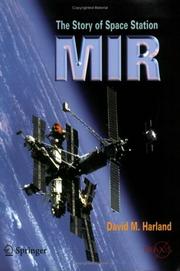
ISBN: 1281148237 9786611148232 0387739777 0387230114 Year: 2005 Publisher: Berlin ; New York : Chichester, UK : Springer ; Published in association with Praxis Publishing,
Abstract | Keywords | Export | Availability | Bookmark
 Loading...
Loading...Choose an application
- Reference Manager
- EndNote
- RefWorks (Direct export to RefWorks)
This successor edition picks up the story where the first edition left off in 1997, and runs through to Mir’s de-orbiting in March 2001, providing the definitive account of the Mir Space Station. The book reviews the origins of the Soviet space station programme, in particular the highly successful Salyuts 6 and 7, describes Mir’s structure, environment, power supply and maneuvering systems, and provides a comprehensive account of how it was assembled and how it operated in orbit. Tells how the Soviet Union's experience with a succession of Salyut space stations led to the development of Mir, which was assembled in space, piece by piece, between 1982 and 1996 and became an international research laboratory whose technology went on to form the 'core modules' of the International Space Station.
Mir (Space station) --- Astronomy. --- Astronautics. --- Astrophysics. --- Popular Science in Astronomy. --- Aerospace Technology and Astronautics. --- Astronomy, Observations and Techniques. --- Space Sciences (including Extraterrestrial Physics, Space Exploration and Astronautics). --- Astronomical physics --- Astronomy --- Cosmic physics --- Physics --- Space sciences --- Aeronautics --- Astrodynamics --- Space flight --- Space vehicles --- Aerospace engineering. --- Observations, Astronomical. --- Astronomy—Observations. --- Space sciences. --- Science and space --- Space research --- Cosmology --- Science --- Astronomical observations --- Observations, Astronomical --- Aeronautical engineering --- Astronautics --- Engineering
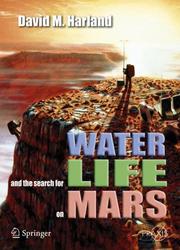
ISBN: 1281349038 9786611349035 0387293728 038726020X Year: 2005 Publisher: Berlin ; New York : Chichester, UK : Springer ; In Association with Praxis Pub.,
Abstract | Keywords | Export | Availability | Bookmark
 Loading...
Loading...Choose an application
- Reference Manager
- EndNote
- RefWorks (Direct export to RefWorks)
"Why explore Mars? The simple answer is, we’re going to Mars to search for life. We’re following the water because on Earth where you find liquid water, organic material, and energy, you find life." u find life" Ed Weiler, NASA's Associate Administrator for Space Science Ear where you find liquid water, A century ago, the world was enthralled by Percival Lowell’s vision of a Mars criss-crossed with the canals of a dying civilization distributing water from the polar caps. Later, Mars was thought to have been cold, dead and dry for eons, but striking new evidence suggests the planet was relatively warm and wet in geologically recent times, and that even now there are reserves of water frozen beneath the planet’s surface. Today, robot spacecraft maneuver across the Martian surface while others orbit overhead seeking evidence of water, ice, and landing sites for further exploration. In recent years, the very possibilities for life have dramatically expanded as discoveries by biologists and oceanographers have revealed bizarre life forms where none would have been expected. And as the growing evidence that water flowed on Mars becomes indisputable, more spacecraft are soon to follow. This highly absorbing book relates how NASA and ESA have sought evidence of life on Mars. ‘Follow the water’ with noted science writer David Harland as he assembles and weighs the evidence in this timely and compelling book. It contains what you need to know behind today’s, and possibly tomorrow’s, headlines, including details of the Mariner, Viking, and Pathfinder missions and evolving theories of Martian geology and climate. It explains how the search accelerates with the Mars Orbiter and Mars Exploration Rovers Spirit and Opportunity. Harland sets this within the broader perspective of the likely nature of life on Mars as compared to primitive life on Earth. Finally, he analyzes the implications of there being life on both planets. Join the scientific adventure of a lifetime in this well-researched and thoroughly engrossing true account.
Mars probes. --- Life on other planets. --- Sondes martiennes. --- Vie extraterrestre. --- Viking Mars Program (U.S.) --- Viking Mars Program (États-Unis) --- Mars (Planet) --- Mars (Planète) --- Exploration. --- Water. --- Eau. --- United States. --- Viking Project (U.S.) --- Project Viking (U.S.) --- Operación Vikingo (U.S.) --- Projekt Viking (U.S.) --- Extraterrestrial life --- Planets --- Fermi's paradox --- Martian probes --- Space probes --- Astronomy. --- Planetology. --- Astrobiology. --- Astrophysics. --- Science (General). --- Popular Science in Astronomy. --- Space Sciences (including Extraterrestrial Physics, Space Exploration and Astronautics). --- Astronomy, Observations and Techniques. --- Popular Science, general. --- Astronomical physics --- Astronomy --- Cosmic physics --- Physics --- Astrobiology --- Biology --- Habitable planets --- Life --- Planetary sciences --- Planetology --- Origin --- Space sciences. --- Observations, Astronomical. --- Astronomy—Observations. --- Popular works. --- Astronomical observations --- Observations, Astronomical --- Science and space --- Space research --- Cosmology --- Science --- Viking Mars Program (Etats-Unis) --- Mars (Planete)
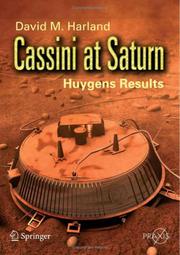
ISBN: 1281044172 9786611044176 0387739785 038726129X Year: 2007 Publisher: Berlin : Springer,
Abstract | Keywords | Export | Availability | Bookmark
 Loading...
Loading...Choose an application
- Reference Manager
- EndNote
- RefWorks (Direct export to RefWorks)
Cassini At Saturn – Huygens Results brings the story of the Cassini-Huygens mission and their joint exploration of the Saturnian system right up to date. Cassini entered orbit around Saturn June 2004 so this update includes 8 months of scientific data available for review, including the most spectacular images of Saturn, its rings and satellites ever obtained by a space mission. As the Cassini spacecraft approached its destination in spring 2004, the quality of the images already being returned by the spacecraft clearly demonstrated the spectacular nature of the close-range views that will be obtained. The book contains a 16-page colour section, comprising a carefully chosen selection of the most stunning images to be released during the spacecraft’s initial period of operation. The Huygens craft, released by Cassini, parachuted through the clouds of Saturn’s largest moon, Titan, in January 2005. David Harland tells the exciting story of the this craft’s journey to the surface of one of the most enigmatic bodies on the Solar System, the only moon to have a dense atmosphere and possibly lakes of liquid gas at -190ºC on its surface. Titan is considered to be an early Earth in deep freeze, possibly with the building blocks of life in its atmosphere. There will undoubtedly be enormous interest in the first results and images of Titan’s surface, and this book is the first incisive summary of this groundbreaking material.
Saturn probes. --- Saturn (Planet) --- Titan (Satellite) --- Exploration. --- Satellites. --- Popular works. --- Planetology. --- Observations, Astronomical. --- Astronomy --- Astronomy. --- Aerospace engineering. --- Astronautics. --- Popular Science. --- Popular Science in Astronomy. --- Astronomy, Observations and Techniques. --- Aerospace Technology and Astronautics. --- Space sciences --- Aeronautics --- Astrodynamics --- Space flight --- Space vehicles --- Aeronautical engineering --- Astronautics --- Engineering --- Physical sciences --- Astronomical observations --- Observations, Astronomical --- Planetary sciences --- Planetology --- Observations. --- Space probes --- Astronomy—Observations.
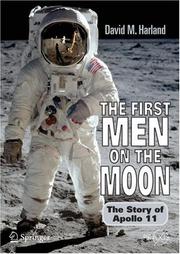
ISBN: 1281107778 9786611107772 0387495444 0387341765 Year: 2007 Publisher: New York ; Berlin : Chichester, U.K. : Springer ; Praxis Publishing,
Abstract | Keywords | Export | Availability | Bookmark
 Loading...
Loading...Choose an application
- Reference Manager
- EndNote
- RefWorks (Direct export to RefWorks)
On 12 April 1961 Yuri Gagarin became the first man to orbit the Earth. One month later, President John F. Kennedy challenged the American nation to land a man on the Moon before the decade was out. On 16 July 1969, Neil Armstrong, Michael Collins and Buzz Aldrin set off in Apollo 11 to attempt this audacious mission, and succeeded magnificently. This book tells the story of Apollo 11, starting with crew selection and training, the choice of the landing site, and the assembly of the space vehicle, then a detailed account of the mission, featuring the lunar landing and moonwalk, and a review of how our knowledge of the Moon's history was revolutionised as a result. The story is enlivened by dialogue between the astronauts in space and the flight controllers in Mission Control.
Space flight to the moon. --- Apollo 11 (Spacecraft) --- Project Apollo (U.S.) --- Moon --- Exploration. --- Apollo Project (U.S.) --- United States. --- Progetto Apollo (U.S.) --- Apollo XI (Spacecraft) --- Apollo Eleven (Spacecraft) --- Flight to the moon --- Lunar expeditions --- Lunar flight --- Astronomy. --- Astrophysics. --- Popular Science in Astronomy. --- Astronomy, Observations and Techniques. --- Space Sciences (including Extraterrestrial Physics, Space Exploration and Astronautics). --- Astronomical physics --- Astronomy --- Cosmic physics --- Physics
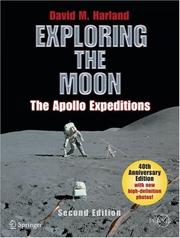
ISBN: 1281401226 9786611401221 0387746412 0387746382 Year: 2008 Publisher: Berlin : Chichester, UK : Springer ; Praxis Pub.,
Abstract | Keywords | Export | Availability | Bookmark
 Loading...
Loading...Choose an application
- Reference Manager
- EndNote
- RefWorks (Direct export to RefWorks)
David Harland opens with a review of the robotic probes, namely the Rangers which returned television before crashing into the Moon, the Surveyors which 'soft landed' in order to investigate the nature of the surface, and the Lunar Orbiters which mapped prospective Apollo landing sites. He then outlines the historic landing by Apollo 11 in terms of what was discovered, and how over the next several missions the program was progressively geared up to enable the final three missions each to spend three days on comprehensive geological investigations. He concludes with a review of the robotic spacecraft that made remote-sensing observations of the Moon. Although aimed at the enthusiast, and can be read as an adventure in exploration, the book develops the scientific theme of lunar geology, and therefore will be of use as background reading for undergraduate students of planetary sciences. In addition, with the prospect of a resumption of human missions, it will help journalists understand what Apollo achieved after the 'flags and footprints' of the Apollo 11 landing in July1969 and will commemorate the fortieth anniversary of that momentous event. Highlighted as a "Commemorative Edition" on the cover, this second edition has a new foreword by one of the original astronauts and a short extra section at the end previewing the prospect of a renewal of human exploration of the Moon. It will include new extra high quality graphics which are only now available and 32 pages of colour illustrations. From the reviews of the first edition - "A detailed guide to what the astronauts did during their stays on the lunar surface. Walk(s) the reader through the prospecting excursions and then incorporate(s) decades of subsequent analysis to put the explorations of dust, rocks, craters, and rilles into geologic context." SKY & TELESCOPE "EXPLORING THE MOON is very well illustrated…All aficionados of the Apollo program will find much to appreciate in [this book]. "…this is an interesting account of one of the most extraordinary decades in history…a very different book. David Harland probably knows more about the nuts and bolts of the Russian and American space programs than any other author and it shows.”LUNAR & PLANETARY INFORMATION BULLETIN.
Space flight to the moon. --- Project Apollo (U.S.) --- History. --- Moon --- Exploration. --- Flight to the moon --- Lunar expeditions --- Lunar flight --- Apollo Project (U.S.) --- United States. --- Progetto Apollo (U.S.) --- Astronomy. --- Astronautics. --- Astrophysics. --- Planetology. --- Popular Science in Astronomy. --- Aerospace Technology and Astronautics. --- Space Sciences (including Extraterrestrial Physics, Space Exploration and Astronautics). --- Astronomy, Observations and Techniques. --- History of Science. --- Planetary sciences --- Planetology --- Astronomical physics --- Astronomy --- Cosmic physics --- Physics --- Space sciences --- Aeronautics --- Astrodynamics --- Space flight --- Space vehicles --- Annals --- Auxiliary sciences of history --- Aerospace engineering. --- Space sciences. --- Observations, Astronomical. --- Astronomy—Observations. --- Astronomical observations --- Observations, Astronomical --- Science and space --- Space research --- Cosmology --- Science --- Aeronautical engineering --- Astronautics --- Engineering
Book
ISBN: 0387681310 9786612827860 0387681329 1282827863 Year: 2009 Publisher: Berlin ; New York : Chichester, U.K. : Springer ; In association with Praxis Pub.,
Abstract | Keywords | Export | Availability | Bookmark
 Loading...
Loading...Choose an application
- Reference Manager
- EndNote
- RefWorks (Direct export to RefWorks)
In 'Paving the Way for Apollo 11' David Harland explains the lure of the Moon to classical philosophers, astronomers, and geologists, and how NASA set out to investigate the Moon in preparation for a manned lunar landing mission. It focuses particularly on the Lunar Orbiter and Surveyor missions.
Apollo 11 (Spacecraft). --- Moon --Exploration. --- Project Apollo (U.S.). --- Space flight to the moon. --- Space flight to the moon --- Astronomy & Astrophysics --- Mechanical Engineering --- Astronomy - General --- Aeronautics Engineering & Astronautics --- Physical Sciences & Mathematics --- Engineering & Applied Sciences --- Apollo 11 (Spacecraft) --- Project Apollo (U.S.) --- Moon --- Exploration. --- Flight to the moon --- Lunar expeditions --- Lunar flight --- Apollo Project (U.S.) --- United States. --- Progetto Apollo (U.S.) --- Apollo XI (Spacecraft) --- Apollo Eleven (Spacecraft) --- Physics. --- Observations, Astronomical. --- Astronomy --- Space sciences. --- Astronomy. --- Astronomy, Observations and Techniques. --- Popular Science in Astronomy. --- Extraterrestrial Physics, Space Sciences. --- Observations. --- Astrophysics. --- Space Sciences (including Extraterrestrial Physics, Space Exploration and Astronautics). --- Astronomical physics --- Cosmic physics --- Physics --- Astronomy—Observations. --- Science and space --- Space research --- Cosmology --- Science --- Astronomical observations --- Observations, Astronomical
Digital
ISBN: 9780387739779 Year: 2005 Publisher: New York, NY Praxis Publishing Ltd
Abstract | Keywords | Export | Availability | Bookmark
 Loading...
Loading...Choose an application
- Reference Manager
- EndNote
- RefWorks (Direct export to RefWorks)
Science --- Space research --- Astrophysics --- ruimtestations --- astrofysica --- popularisering wetenschap --- ruimte (astronomie) --- ruimtevaart --- astronomie
Digital
ISBN: 9780387293721 Year: 2005 Publisher: New York, NY Praxis Publishing Ltd
Abstract | Keywords | Export | Availability | Bookmark
 Loading...
Loading...Choose an application
- Reference Manager
- EndNote
- RefWorks (Direct export to RefWorks)
Science --- Space research --- Solar system --- Astrophysics --- Biology --- zonnestelsel --- astrofysica --- popularisering wetenschap --- biologie --- ruimte (astronomie) --- planeten --- ruimtevaart --- astronomie
Digital
ISBN: 9780387739786 Year: 2007 Publisher: New York, NY Praxis Publishing Ltd
Abstract | Keywords | Export | Availability | Bookmark
 Loading...
Loading...Choose an application
- Reference Manager
- EndNote
- RefWorks (Direct export to RefWorks)
Science --- Space research --- Solar system --- Astrophysics --- zonnestelsel --- astrofysica --- popularisering wetenschap --- ruimte (astronomie) --- planeten --- ruimtevaart --- astronomie
Digital
ISBN: 9780387495446 Year: 2007 Publisher: New York, NY Praxis Publishing Ltd
Abstract | Keywords | Export | Availability | Bookmark
 Loading...
Loading...Choose an application
- Reference Manager
- EndNote
- RefWorks (Direct export to RefWorks)
Science --- Space research --- Astrophysics --- astrofysica --- popularisering wetenschap --- ruimte (astronomie) --- ruimtevaart --- astronomie
| Listing 1 - 10 of 43 | << page >> |
Sort by
|

 Search
Search Feedback
Feedback About UniCat
About UniCat  Help
Help News
News